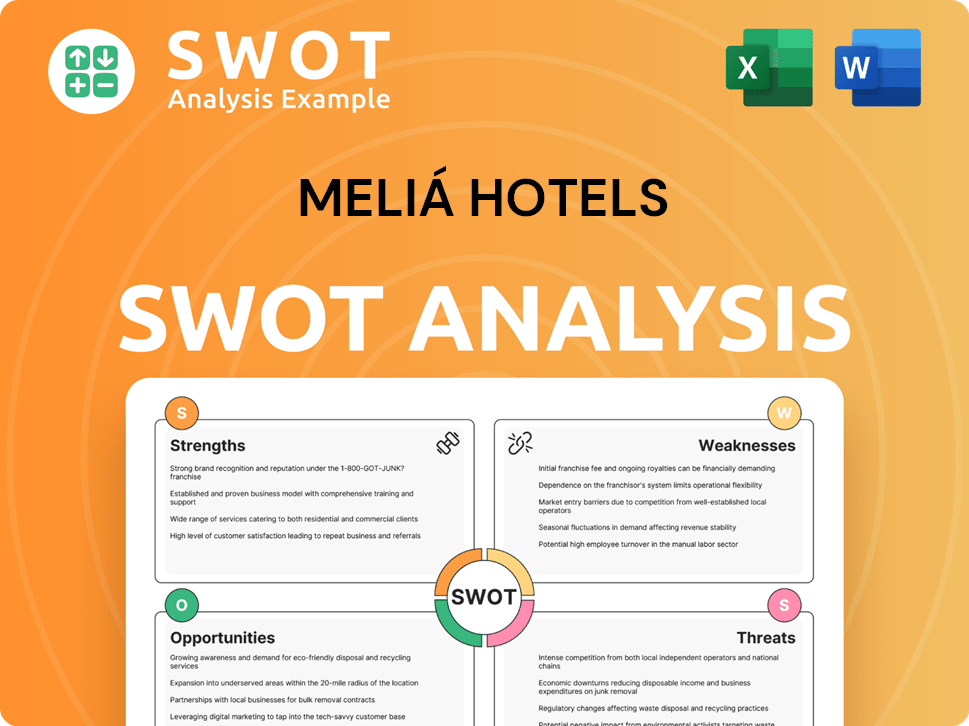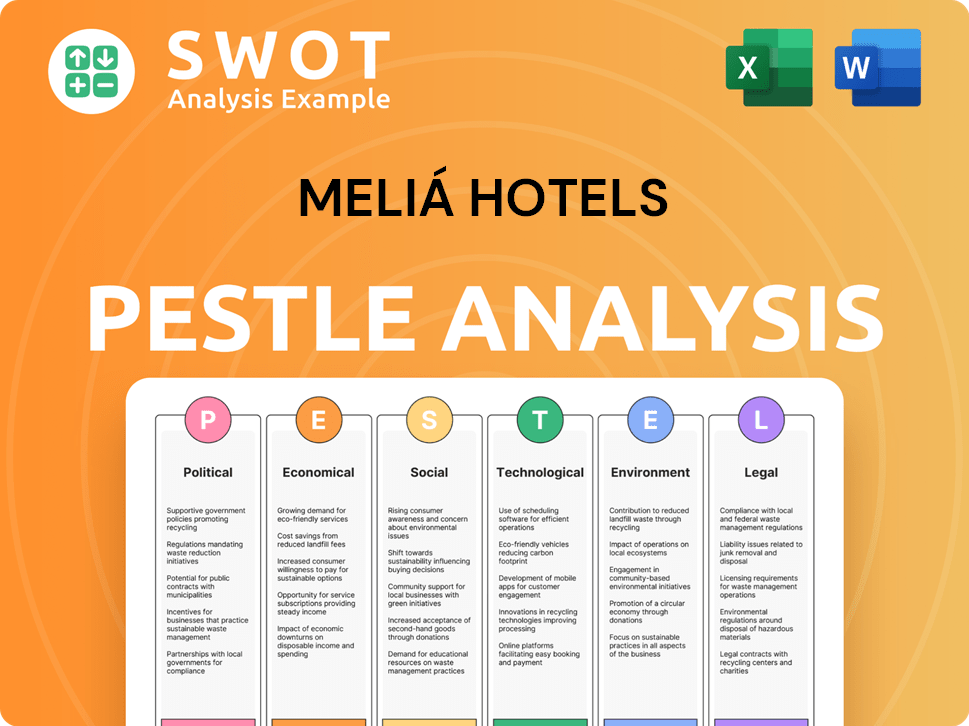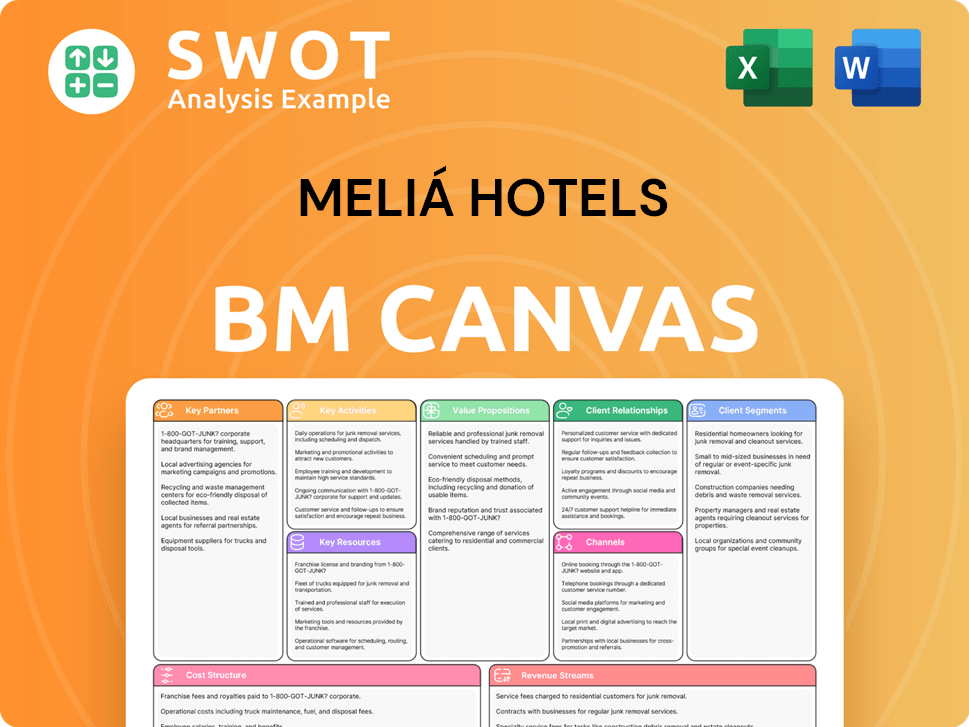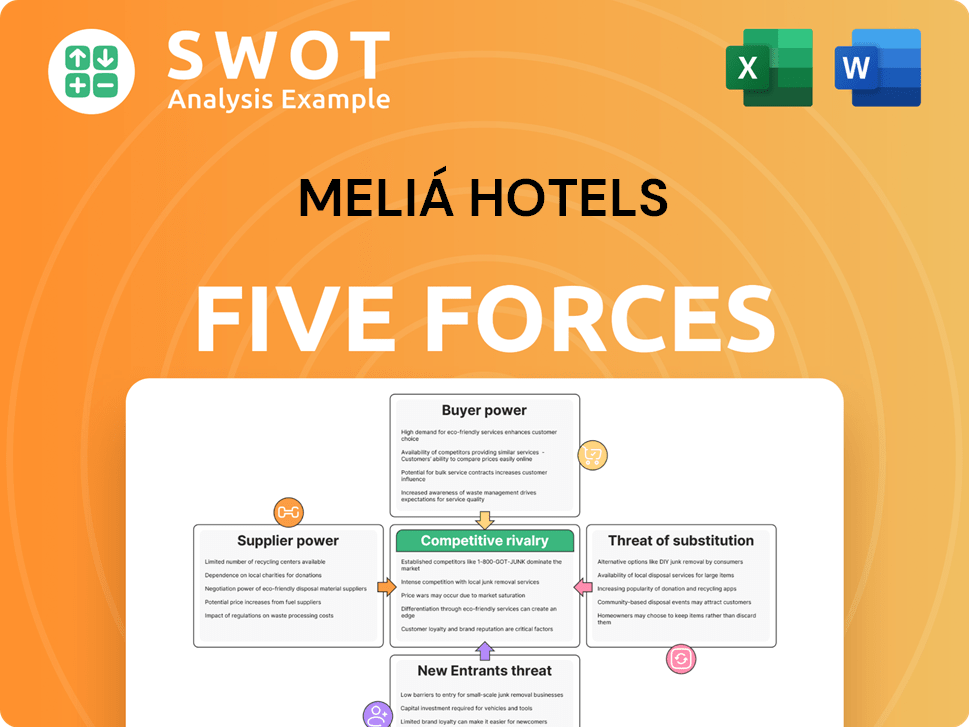Meliá Hotels Bundle
Can Meliá Hotels Company Continue Its Ascent in the Global Hospitality Market?
From its inception in 1956, Meliá Hotels International has transformed from a single hotel to a global powerhouse, navigating decades of market shifts and industry evolution. This journey underscores the crucial role of its Meliá Hotels SWOT Analysis and growth strategy in shaping its destiny within the dynamic hotel industry trends. As the company charts its course for the future, understanding its expansion plans and strategic initiatives is paramount for investors and industry watchers alike.

The recent passing of founder Gabriel Escarrer Juliá, a defining moment, reinforces the company's commitment to excellence and its strategic vision. Meliá Hotels Company's impressive post-COVID recovery, surpassing 2019 financial performance, highlights its resilience and adaptability. This success, particularly in RevPAR growth, positions Meliá Hotels' future for continued success, fueled by strategic agility and a keen understanding of the hospitality market analysis.
How Is Meliá Hotels Expanding Its Reach?
Meliá Hotels International is actively pursuing an aggressive expansion plan, focusing on its premium and luxury segments. This strategy is a key part of the Growth Strategy Meliá is implementing to increase its global footprint and market share. The company's approach involves strategic investments and partnerships to capitalize on Hotel industry trends and meet the evolving demands of travelers.
In 2024, Meliá signed 34 new hotels, adding over 5,000 rooms. This expansion demonstrates the company's commitment to growth and its ability to secure new properties. The company's Meliá expansion plans are supported by its asset-light strategy, which allows for faster growth and reduced financial risk. This strategy is a core element of the company's approach to the Hospitality market analysis.
For 2025, Meliá plans to sign at least 25 new hotels and open a minimum of 20 new properties. This indicates a continued acceleration of its expansion efforts. The current pipeline includes 72 hotels with more than 13,000 rooms, primarily under management agreements. This approach helps Meliá to generate revenue without significant capital investments, reducing financial risk and supporting its Meliá Hotels future.
Meliá is targeting new markets such as the Maldives, Seychelles, and Turkey. It is also strengthening its presence in key vacation destinations. The company is expanding significantly in emerging European destinations and Southeast Asia.
The company's asset-light approach allows for expansion without significant capital investments. This strategy includes management agreements. This approach reduces financial risk and supports faster growth.
Specific new openings for 2025 include ME by Meliá hotels in Malta, Lisbon, Malaga, and Marbella, and ZEL properties in Punta Cana and Sayulita, Mexico. The Meliá Collection will also see new openings in Milan and Vietnam in 2025. The repositioning strategy involves transforming existing hotels.
Between 2023 and 2024, 23 hotels were repositioned with an investment exceeding €235 million. This investment reflects Meliá's commitment to enhancing its brand portfolio and improving the guest experience. The company's growth strategy is designed to drive revenue and profitability.
Meliá is focusing on expanding its presence in key regions and strengthening its brand portfolio. This includes a mix of new openings and repositioning existing properties. The company's expansion strategy is supported by its financial performance and asset-light business model.
- Southeast Asia: Leading hotel operator in Vietnam with over 8,000 rooms.
- Caribbean: Growing with new openings in Mexico and the Dominican Republic.
- Europe: Expanding significantly in emerging destinations like Albania and Malta.
- Luxury Segment: Focus on premium and luxury brands like ME by Meliá, ZEL, and Meliá Collection.
For further insights into the company's financial structure and ownership, you can explore Owners & Shareholders of Meliá Hotels.
Meliá Hotels SWOT Analysis
- Complete SWOT Breakdown
- Fully Customizable
- Editable in Excel & Word
- Professional Formatting
- Investor-Ready Format

How Does Meliá Hotels Invest in Innovation?
Meliá Hotels International is heavily invested in innovation and technology to boost guest experiences, streamline operations, and foster sustained growth. Their 'Be Digital 360' strategy is a cornerstone, focusing on technological advancements and enhanced analytical capabilities. This approach is crucial for adapting to evolving hotel industry trends and maintaining a competitive edge in the hospitality market analysis.
The company's focus on direct distribution channels, such as Melia.com and the Meliá App, highlights its commitment to digital transformation. These channels are vital for engaging directly with customers and providing personalized experiences. The integration of data analytics and AI further enhances this, allowing for a deeper understanding of the guest journey from booking to post-stay.
Meliá's strategic use of technology extends to its operational efficiency and customer loyalty programs, demonstrating a comprehensive approach to growth. This includes the implementation of Oracle Hospitality OPERA Cloud and the evolution of its loyalty programs. The company's commitment to sustainability, through its 'Travel for Good' program, is also a key part of its overall growth strategy.
Melia.com and the Meliá App exceeded €1,000 million in sales in 2024. Proprietary channels now account for 50% of centralized sales, underscoring the importance of direct engagement with customers. This strategy is designed to improve customer relationships and boost revenue.
The B2B sales platform, MeliaPro, saw a 21% increase in sales in 2024. This growth surpassed the B2C channel's 19% increase. This indicates effective strategies for reaching and engaging with business clients.
Meliá uses data analytics and digital tools, including AI, to personalize guest experiences. These tools analyze the guest journey from booking through post-stay interactions. This approach enhances customer satisfaction and operational efficiency.
The implementation of Oracle Hospitality OPERA Cloud streamlines operations. It integrates vital IT systems onto one platform. This integration provides a holistic view of business performance with real-time operational data.
MeliáRewards, celebrating its 30th anniversary in 2024, has over 17 million members. The program contributes 85% of revenue from direct channels. Club Meliá, with over 30,000 members, further strengthens customer loyalty.
The 'Travel for Good' program integrates ESG principles into the business strategy. This includes efforts towards carbon neutrality, waste management, and inclusive employment. Gran Meliá Villa Le Blanc achieved 'Net Zero' hotel status by the end of 2024.
Meliá Hotels Company's growth strategy is significantly influenced by its digital transformation efforts and commitment to sustainability. These initiatives are designed to enhance customer experiences and drive operational efficiencies, which are critical for future investment opportunities.
- Digital Transformation: The 'Be Digital 360' strategy focuses on direct distribution, with Melia.com and the Meliá App being key drivers. The expansion of the B2B platform, MeliaPro, also plays a crucial role.
- Data Analytics and AI: Utilizing data analytics and AI to personalize guest experiences from booking to post-stay. This approach enables Meliá to understand guest preferences and tailor services accordingly.
- Operational Efficiency: Implementing Oracle Hospitality OPERA Cloud streamlines operations, integrates IT systems, and offers real-time data for better decision-making.
- Loyalty Programs: MeliáRewards and Club Meliá are central to customer retention, contributing significantly to revenue from direct channels.
- Sustainability: The 'Travel for Good' program integrates ESG principles, including carbon neutrality and waste management, reflecting a commitment to sustainable tourism initiatives.
For more insights, you can explore the Mission, Vision & Core Values of Meliá Hotels.
Meliá Hotels PESTLE Analysis
- Covers All 6 PESTLE Categories
- No Research Needed – Save Hours of Work
- Built by Experts, Trusted by Consultants
- Instant Download, Ready to Use
- 100% Editable, Fully Customizable

What Is Meliá Hotels’s Growth Forecast?
In 2024, Meliá Hotels International demonstrated robust financial recovery, surpassing pre-pandemic levels in revenue and profitability. The company's strategic initiatives and market positioning have enabled it to capitalize on the resurgence in travel demand. This performance underscores the effectiveness of its growth strategy and its ability to adapt to evolving hotel industry trends.
The company's financial results for 2024 reflect a strong rebound in the hospitality market analysis. Key metrics such as EBITDA and RevPAR have shown significant improvements, indicating a return to financial health. The company's focus on high-value segments, particularly luxury hotels, has contributed to its strong performance. These results are a testament to the company's resilience and strategic foresight.
Meliá Hotels future outlook appears promising, supported by its strategic initiatives and market positioning. The company's expansion plans and focus on sustainable tourism initiatives are expected to drive further growth. The company's focus on operational efficiency and strategic investments positions it well for continued success in the competitive landscape.
In 2024, Meliá Hotels Company saw its earnings increase by 24.5% to €162 million. EBITDA (excluding capital gains) reached €533.6 million, a 9.7% increase compared to 2023. The EBITDA margin improved by 129 basis points to 26.5%.
Group revenue, excluding capital gains, rose by 4.4% to €2,013 million in 2024. RevPAR (Revenue Per Available Room) grew by 10.7% compared to 2023, with 75% of this growth driven by higher average prices.
The company's asset valuation by CB Richard Ellis as of December 31, 2024, stands at €5,285 million, an increase of 13.88% compared to 2022. Meliá Hotels Company significantly reduced its pre-IFRS16 Net Financial Debt by €391 million to €772.7 million.
The company achieved a Net Financial Debt/EBITDA ratio of 2.2x, returning to pre-pandemic levels. For the fiscal year 2025, Meliá Hotels future anticipates a mid-single-digit increase in RevPAR, with an even contribution between prices and occupancy.
Meliá Hotels Company has demonstrated a strong financial recovery in 2024, exceeding pre-pandemic revenue and profit levels. The company's strategic focus on asset rotation and operational efficiency has significantly reduced its debt.
- Growth Strategy Meliá is focusing on luxury hotels, which now contribute 40% of operating revenue, with RevPAR growth exceeding 30% in this segment.
- The company anticipates a healthy stabilization in both leisure and business demand for 2025, with a mid-single-digit increase in RevPAR.
- Despite a slight miss in revenue estimates for Q1 2025, the company expects revenue to grow 2.7% per annum on average over the next three years.
- The company's focus on asset rotation and operational efficiency has significantly reduced its debt.
Meliá Hotels Business Model Canvas
- Complete 9-Block Business Model Canvas
- Effortlessly Communicate Your Business Strategy
- Investor-Ready BMC Format
- 100% Editable and Customizable
- Clear and Structured Layout

What Risks Could Slow Meliá Hotels’s Growth?
Despite the promising outlook for Meliá Hotels Company, several risks and obstacles could impact its growth trajectory. The hospitality market, like any global industry, faces ongoing challenges from macroeconomic and geopolitical uncertainties. These external factors can influence travel demand, operational costs, and overall financial performance for Meliá Hotels.
Meliá must continuously adapt to maintain its competitive edge. This involves strategic management, focusing on profitable market segments, and responding to shifts in consumer preferences and industry trends. The company's ability to navigate these challenges will be crucial for its future success. For a deeper understanding of the company's origins and development, consider reading Brief History of Meliá Hotels.
The company acknowledges that technological advancements and internal resource constraints pose significant challenges. Successfully addressing these issues is vital for Meliá's long-term growth and sustainability. The company's strategies to mitigate these risks will determine its ability to capitalize on future opportunities.
The hotel industry is highly competitive, requiring constant optimization of operations and a focus on profitable segments. Meliá faces competition from both established hotel chains and emerging players. Maintaining a strong brand reputation and offering unique guest experiences are essential for attracting and retaining customers in this environment.
Changes in regulations, particularly those concerning sustainability and labor laws, can impact Meliá's operations. Compliance with these evolving standards may require investments in new technologies, processes, and training. Adapting to these changes is critical for maintaining legal and ethical standards.
While not specifically detailed, supply chain issues can affect hotel development and operational costs. Disruptions in the supply of materials, equipment, or services could lead to delays and increased expenses. Proactive supply chain management is essential for mitigating these risks.
The need for continuous investment in digital tools and platforms to meet evolving customer expectations and maintain efficiency is ongoing. Meliá's 'Be Digital 360' strategy and investments in platforms like Melia.com and MeliaPro are critical to staying competitive. Digital transformation is crucial for enhancing guest experiences and streamlining operations.
Talent acquisition and retention are significant challenges. Meliá addresses this through partnerships with universities, clear career paths, extensive e-learning programs, and flexible work arrangements. A skilled and motivated workforce is essential for delivering high-quality service and achieving business goals.
Unforeseen global events or changes in travel patterns can significantly impact Meliá's performance. The company's focus on qualitative growth, strengthening its balance sheet, and emphasizing sustainability aims to build a more resilient and profitable future. Adapting to changing market conditions is key.
The COVID-19 pandemic had a significant impact on the hotel industry. While Meliá has navigated the post-pandemic recovery, the effects of the pandemic continue to influence travel patterns and demand. The company's ability to adapt to changing consumer behaviors and health protocols is crucial.
Meliá's commitment to sustainable tourism is essential for long-term success. This includes initiatives to reduce environmental impact, support local communities, and promote responsible travel practices. Sustainability is increasingly important to both travelers and investors.
Meliá Hotels Porter's Five Forces Analysis
- Covers All 5 Competitive Forces in Detail
- Structured for Consultants, Students, and Founders
- 100% Editable in Microsoft Word & Excel
- Instant Digital Download – Use Immediately
- Compatible with Mac & PC – Fully Unlocked

Related Blogs
- What are Mission Vision & Core Values of Meliá Hotels Company?
- What is Competitive Landscape of Meliá Hotels Company?
- How Does Meliá Hotels Company Work?
- What is Sales and Marketing Strategy of Meliá Hotels Company?
- What is Brief History of Meliá Hotels Company?
- Who Owns Meliá Hotels Company?
- What is Customer Demographics and Target Market of Meliá Hotels Company?
Disclaimer
All information, articles, and product details provided on this website are for general informational and educational purposes only. We do not claim any ownership over, nor do we intend to infringe upon, any trademarks, copyrights, logos, brand names, or other intellectual property mentioned or depicted on this site. Such intellectual property remains the property of its respective owners, and any references here are made solely for identification or informational purposes, without implying any affiliation, endorsement, or partnership.
We make no representations or warranties, express or implied, regarding the accuracy, completeness, or suitability of any content or products presented. Nothing on this website should be construed as legal, tax, investment, financial, medical, or other professional advice. In addition, no part of this site—including articles or product references—constitutes a solicitation, recommendation, endorsement, advertisement, or offer to buy or sell any securities, franchises, or other financial instruments, particularly in jurisdictions where such activity would be unlawful.
All content is of a general nature and may not address the specific circumstances of any individual or entity. It is not a substitute for professional advice or services. Any actions you take based on the information provided here are strictly at your own risk. You accept full responsibility for any decisions or outcomes arising from your use of this website and agree to release us from any liability in connection with your use of, or reliance upon, the content or products found herein.